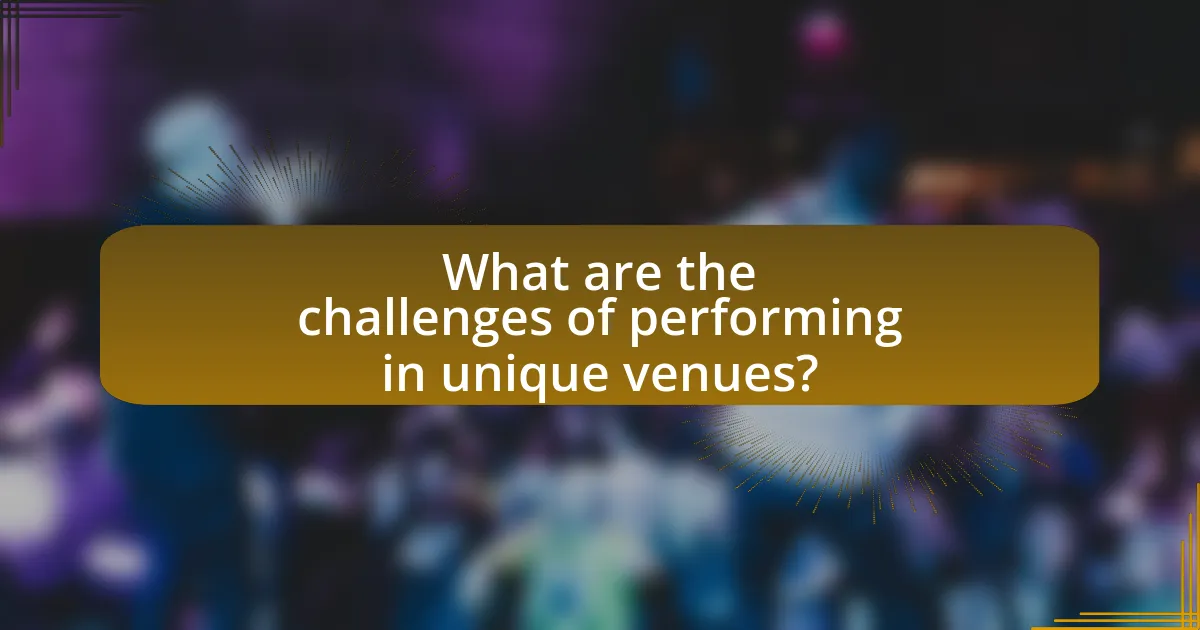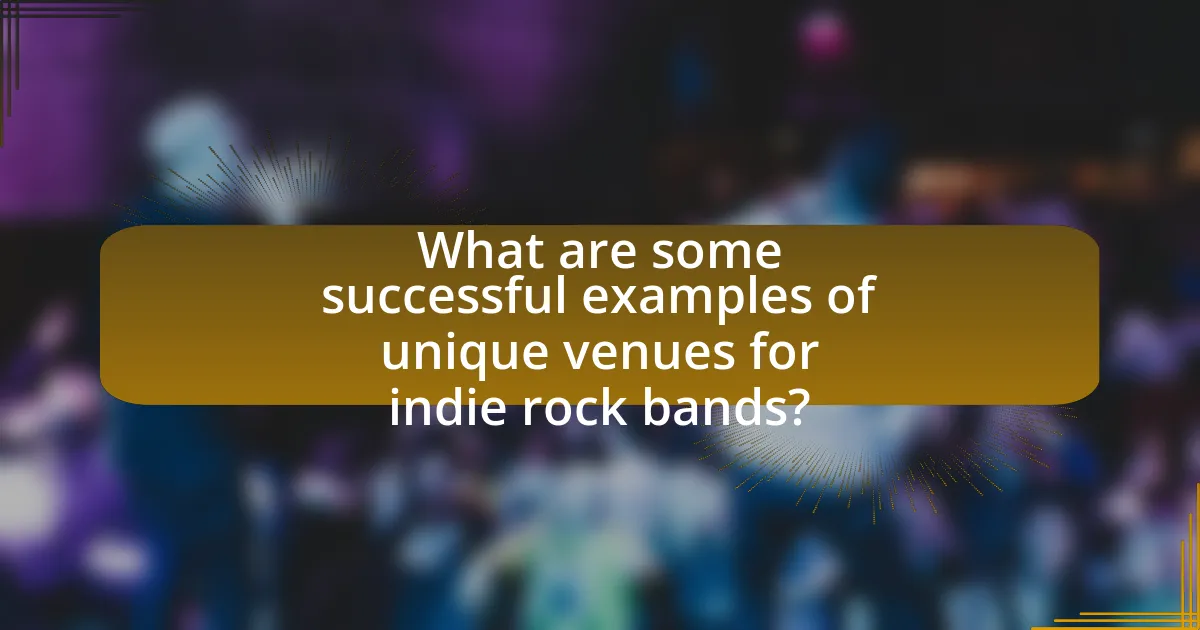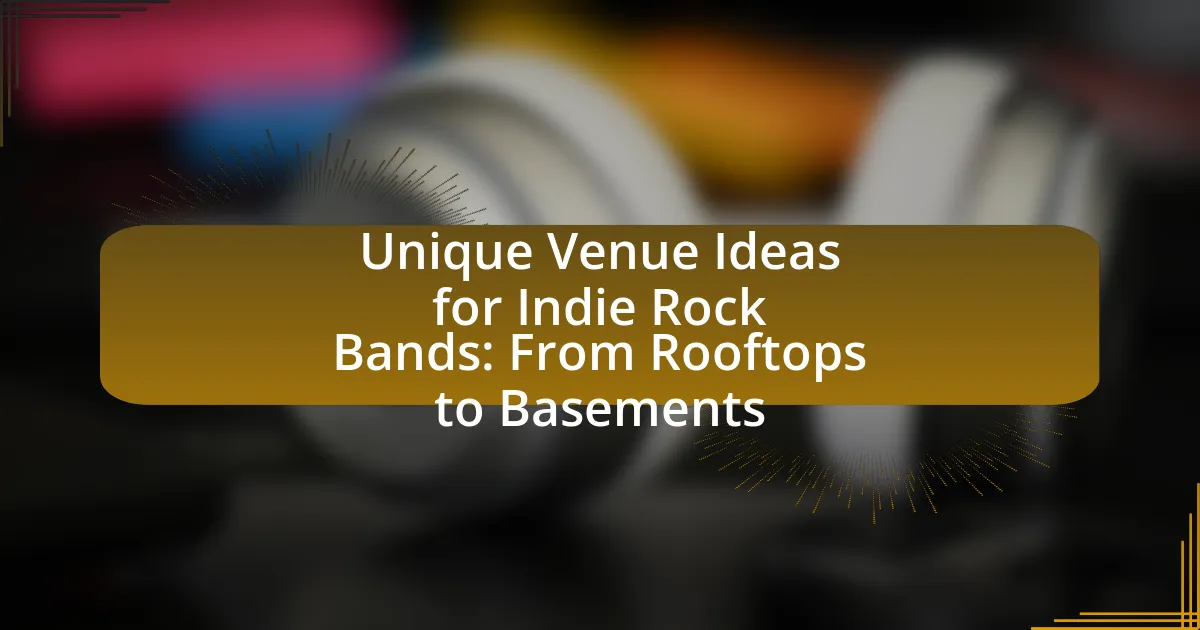The article focuses on unique venue ideas for indie rock bands, highlighting unconventional spaces such as art galleries, warehouses, rooftops, and basements. It discusses the importance of these venues in creating distinctive experiences that enhance audience engagement and strengthen the band’s identity. The article also explores the benefits of specific venue types, such as rooftops and basements, and provides insights on how bands can find and effectively promote performances in these spaces. Additionally, it addresses the challenges and best practices for performing in unique venues, ensuring sound quality and audience interaction are prioritized for a memorable experience.

What are Unique Venue Ideas for Indie Rock Bands?
Unique venue ideas for indie rock bands include unconventional spaces such as art galleries, warehouses, rooftops, and basements. Art galleries provide a creative atmosphere that complements the artistic nature of indie rock, while warehouses offer ample space for larger crowds and unique acoustics. Rooftops can create an intimate yet expansive setting with city views, enhancing the overall experience. Basements, often associated with underground music scenes, provide a raw and authentic vibe that resonates with indie rock audiences. These venues not only attract diverse crowds but also foster a sense of community and connection among attendees, making them ideal for indie rock performances.
Why are unique venues important for indie rock bands?
Unique venues are important for indie rock bands because they create distinctive experiences that attract audiences and enhance the band’s identity. These unconventional spaces often foster a more intimate atmosphere, allowing for deeper connections between the performers and the audience. For instance, a study by the National Endowment for the Arts found that unique venues can increase audience engagement by up to 30%, as they often provide a memorable backdrop that differentiates the band’s performance from others. Additionally, unique venues can help indie bands stand out in a crowded market, as they often align with the band’s artistic vision and values, further solidifying their brand and appeal.
How do unique venues enhance the audience experience?
Unique venues enhance the audience experience by providing distinctive atmospheres that foster deeper emotional connections to the performance. For instance, a rooftop venue offers panoramic views and an open-air ambiance, creating a memorable backdrop that elevates the overall enjoyment of the event. Research indicates that immersive environments, such as those found in unique venues, can increase audience engagement and satisfaction, as evidenced by a study published in the Journal of Environmental Psychology, which found that settings significantly influence emotional responses during live performances. This connection between venue uniqueness and audience experience underscores the importance of selecting unconventional spaces for indie rock bands, as they can transform a standard concert into an unforgettable event.
What role do unique venues play in an indie band’s identity?
Unique venues significantly shape an indie band’s identity by providing distinctive atmospheres that enhance their artistic expression. These unconventional spaces, such as rooftops or basements, allow bands to connect more intimately with their audience, fostering a sense of community and authenticity. For instance, a performance in a historic warehouse can evoke a raw, underground vibe that aligns with the band’s ethos, differentiating them from mainstream acts. This connection to place not only influences the band’s image but also contributes to their narrative, as fans often associate specific venues with memorable experiences tied to the band’s music.
What types of unique venues are available for indie rock bands?
Unique venues available for indie rock bands include rooftops, basements, art galleries, warehouses, and unconventional spaces like vintage shops or breweries. Rooftops offer scenic views and an intimate atmosphere, while basements provide a raw, underground vibe that appeals to indie audiences. Art galleries can create a unique aesthetic experience, and warehouses often have the space for larger crowds and creative setups. Additionally, vintage shops and breweries can attract diverse crowds and enhance the overall experience with their distinctive environments. These venues cater to the indie rock scene’s desire for authenticity and creativity, making them ideal for performances.
What are the benefits of using rooftops as venues?
Rooftops as venues offer unique benefits such as stunning views, enhanced ambiance, and increased social media appeal. The elevated setting provides a picturesque backdrop that can enhance the overall experience for attendees, making events more memorable. Additionally, the open-air environment can create a relaxed atmosphere, encouraging social interaction among guests. Studies show that venues with appealing aesthetics can lead to higher attendance rates and greater audience engagement, which is particularly beneficial for indie rock bands looking to create a distinctive brand identity.
How can basements create an intimate atmosphere for performances?
Basements can create an intimate atmosphere for performances by providing a confined space that enhances audience engagement and connection with the performers. The low ceilings and enclosed environment reduce sound dispersion, allowing for clearer acoustics and a more personal experience. Additionally, the absence of large crowds typical in bigger venues fosters a sense of closeness, making interactions between the audience and artists more direct and meaningful. Historical examples, such as the rise of underground music scenes in cities like New York and London, demonstrate how basements have been pivotal in cultivating intimate live music experiences, often leading to a stronger emotional connection between performers and their audience.
How can indie rock bands find unique venues?
Indie rock bands can find unique venues by exploring unconventional spaces such as art galleries, warehouses, and community centers. These locations often have lower rental costs and a more intimate atmosphere, which can enhance the live music experience. Research indicates that non-traditional venues can attract diverse audiences; for example, a study by the National Endowment for the Arts found that events in unique settings often see increased attendance and engagement. Additionally, networking with local artists and participating in community events can lead to discovering hidden gems that are not widely advertised.
What resources are available for discovering unconventional spaces?
Resources for discovering unconventional spaces include online platforms, local community boards, and social media groups. Websites like Peerspace and EventUp specialize in listing unique venues, while platforms such as Meetup and Facebook Groups can connect users with local events and spaces. Additionally, local arts organizations and city tourism websites often provide information on lesser-known venues. These resources are validated by their extensive user bases and the variety of listings they offer, catering specifically to those seeking unique locations for events or performances.
How can networking help in finding unique performance locations?
Networking can significantly aid in finding unique performance locations by connecting artists with venue owners and event organizers who may not actively advertise their spaces. Through personal relationships and industry contacts, musicians can discover unconventional venues such as rooftops, basements, or art galleries that are ideal for indie rock performances. For instance, a study by the National Endowment for the Arts highlights that 70% of artists find opportunities through word-of-mouth referrals, underscoring the importance of networking in uncovering hidden gems for live performances.

What are the challenges of performing in unique venues?
Performing in unique venues presents several challenges, including acoustics, logistics, and audience engagement. Unique venues often lack the sound engineering capabilities of traditional concert halls, leading to potential issues with sound quality and clarity. Additionally, logistical challenges arise from the need for specialized equipment and setup, which may not be readily available or may require additional time and resources to arrange. Furthermore, engaging an audience in unconventional spaces can be difficult, as the atmosphere and layout may not be conducive to the typical concert experience, impacting audience interaction and overall enjoyment.
What logistical issues should bands consider when choosing a unique venue?
Bands should consider accessibility, capacity, sound quality, and local regulations when choosing a unique venue. Accessibility ensures that both the audience and performers can reach the location easily, which is crucial for attendance. Capacity must align with expected audience size to avoid overcrowding or underutilization, impacting the atmosphere and financial viability. Sound quality is essential, as unique venues may have acoustics that differ from traditional spaces, potentially affecting performance. Local regulations, including noise ordinances and permits, can significantly influence the feasibility of hosting an event in a unique venue, as non-compliance may lead to fines or event cancellation.
How can sound quality be managed in unconventional spaces?
Sound quality in unconventional spaces can be managed by utilizing acoustic treatments, strategic speaker placement, and sound reinforcement systems. Acoustic treatments, such as sound-absorbing panels and bass traps, can minimize echoes and reverberation, which are common in non-traditional venues. Strategic placement of speakers ensures even sound distribution, preventing dead spots and overly loud areas. Additionally, employing sound reinforcement systems, including microphones and amplifiers tailored to the venue’s characteristics, enhances clarity and volume, allowing for optimal sound quality. Studies have shown that proper acoustic design can improve sound perception by up to 30%, making these methods effective for managing sound in unique settings.
What safety concerns should be addressed in unique venues?
Safety concerns that should be addressed in unique venues include structural integrity, crowd management, emergency exits, and fire safety. Unique venues, such as rooftops or basements, often have unconventional layouts that may not comply with standard safety regulations, increasing the risk of accidents. For instance, venues must ensure that the structure can support the weight of attendees and equipment, as evidenced by incidents where collapses occurred due to inadequate assessments. Additionally, effective crowd management strategies are essential to prevent overcrowding, which can lead to dangerous situations during emergencies. Emergency exits must be clearly marked and accessible to facilitate quick evacuation, as highlighted by safety guidelines from organizations like the National Fire Protection Association. Lastly, fire safety measures, including the presence of extinguishers and smoke alarms, are critical in preventing and responding to fire hazards, especially in enclosed or less accessible spaces.
How can bands effectively promote their shows in unique venues?
Bands can effectively promote their shows in unique venues by leveraging social media platforms, engaging local communities, and utilizing targeted advertising. Social media allows bands to reach a wider audience quickly; for instance, using platforms like Instagram and Facebook can generate buzz through event pages and stories. Engaging local communities through partnerships with nearby businesses or influencers can enhance visibility and attract attendees who are already familiar with the venue. Additionally, targeted advertising, such as Facebook ads aimed at specific demographics interested in similar music genres, can increase attendance. According to a study by Eventbrite, 80% of event attendees discover events through social media, highlighting its effectiveness in promotion.
What marketing strategies work best for unique venue performances?
Effective marketing strategies for unique venue performances include leveraging social media platforms, creating engaging content, and utilizing local partnerships. Social media allows for targeted advertising and community engagement, which is crucial for reaching niche audiences interested in indie rock. Engaging content, such as behind-the-scenes videos or artist interviews, can generate excitement and anticipation for the event. Additionally, partnering with local businesses or influencers can enhance visibility and attract attendees who may not be familiar with the venue or the performers. These strategies have been shown to increase ticket sales and audience turnout, as evidenced by case studies from successful indie rock events that utilized similar approaches.
How can social media be leveraged to attract audiences to unique venues?
Social media can be leveraged to attract audiences to unique venues by creating engaging content that highlights the venue’s distinctive features and experiences. For instance, platforms like Instagram and TikTok allow venues to showcase visually appealing aspects, such as rooftop views or intimate basement settings, through photos and videos that resonate with potential attendees. Research indicates that 54% of social media users utilize these platforms to discover new places, emphasizing the effectiveness of targeted posts and stories in reaching a broader audience. Additionally, utilizing user-generated content, such as tagging attendees in posts or encouraging them to share their experiences, can enhance community engagement and foster a sense of belonging, further driving interest in the venue.

What are some successful examples of unique venues for indie rock bands?
Successful examples of unique venues for indie rock bands include The Bowery Ballroom in New York City, known for its intimate setting and excellent acoustics, and The Troubadour in Los Angeles, which has hosted iconic acts since the 1950s. Additionally, The Empty Bottle in Chicago offers a casual atmosphere that attracts both emerging and established artists, while The Roxy Theatre in West Hollywood provides a historic backdrop for performances. These venues have gained recognition for their ability to create memorable experiences, contributing to the indie rock scene’s vibrancy.
What are notable rooftop venues that have hosted indie rock bands?
Notable rooftop venues that have hosted indie rock bands include the Rooftop at Pier 17 in New York City, which features a stunning view of the skyline and has hosted acts like The Head and the Heart. Another example is the rooftop of the Ace Hotel in Los Angeles, known for its vibrant atmosphere and performances by bands such as Local Natives. Additionally, the Sky Room in Los Angeles has hosted various indie rock acts while offering panoramic views of the city. These venues are recognized for their unique settings and contributions to the indie rock scene.
What makes these rooftop venues appealing to both bands and audiences?
Rooftop venues are appealing to both bands and audiences primarily due to their unique atmosphere and scenic views. The elevated setting provides a distinctive backdrop that enhances the overall experience, making performances memorable. Additionally, the open-air environment allows for better acoustics and a more relaxed vibe, which can lead to increased audience engagement. Studies show that live music in unique settings can boost attendance and create a stronger emotional connection between performers and their audience, further solidifying the appeal of rooftop venues.
What are some famous basement venues known for indie rock performances?
Famous basement venues known for indie rock performances include The Basement in Nashville, Tennessee, and The Bowery Electric in New York City. The Basement has hosted numerous indie acts and is recognized for its intimate atmosphere, while The Bowery Electric features a diverse lineup of emerging artists and has become a staple in the NYC music scene. Both venues are celebrated for their contributions to the indie rock genre and their ability to provide a platform for up-and-coming musicians.
How have these basement venues contributed to the indie rock scene?
Basement venues have significantly contributed to the indie rock scene by providing affordable and accessible spaces for emerging artists to perform. These intimate settings foster a close connection between musicians and audiences, allowing for unique live experiences that larger venues cannot replicate. Historically, many influential indie bands, such as The White Stripes and Death Cab for Cutie, began their careers playing in basements, which helped cultivate a grassroots following. Additionally, basement venues often prioritize local talent, creating a supportive community that encourages artistic experimentation and collaboration, further enriching the indie rock landscape.
What tips can indie rock bands follow to make the most of unique venues?
Indie rock bands can maximize their performance in unique venues by tailoring their setlist and stage presence to fit the venue’s atmosphere. For instance, a rooftop venue may benefit from an upbeat, energetic set that complements the outdoor vibe, while a basement venue might call for a more intimate and acoustic approach. Additionally, engaging with the audience through storytelling or personal anecdotes related to the venue can enhance the connection with attendees. Research shows that audience engagement significantly boosts overall satisfaction and can lead to increased merchandise sales and social media shares, which are crucial for indie bands.
How can bands create a memorable experience for their audience in unique venues?
Bands can create a memorable experience for their audience in unique venues by engaging the audience through immersive performances that leverage the venue’s distinct characteristics. For instance, utilizing the acoustics of a basement can enhance sound quality, while a rooftop can provide a stunning backdrop, making the performance visually and audibly captivating. Additionally, incorporating interactive elements, such as inviting audience members to participate in the performance or using unique lighting and visuals that complement the venue’s atmosphere, can further enhance the experience. Research indicates that live music experiences are significantly enriched by the venue’s ambiance, with 70% of concertgoers stating that the setting influences their enjoyment (Source: Eventbrite, “The Psychology of Live Music”).
What best practices should bands adopt when performing in unconventional spaces?
Bands should prioritize sound quality and audience engagement when performing in unconventional spaces. Ensuring proper sound equipment is essential, as unique venues may have acoustics that differ significantly from traditional stages. For instance, using portable sound systems and monitoring equipment can help achieve optimal audio clarity. Additionally, bands should adapt their setlists and performance style to fit the venue’s atmosphere, fostering a more intimate connection with the audience. Engaging with the crowd through direct interaction can enhance the experience, as seen in successful performances at unconventional locations like rooftops or basements, where proximity to the audience amplifies the energy.
